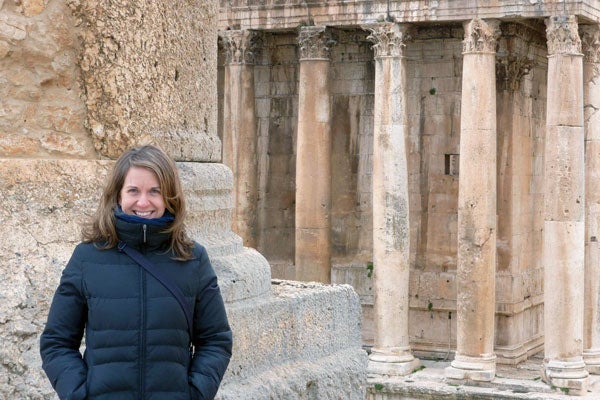
Where the grads go: UTSC's international development studies program
Published: November 19, 2014
One is currently working in war-torn Iraq. Another brought together feuding political groups in Lebanon. A third helps empower communities in southern Africa and India.
As they celebrated the 30th anniversary of UTSC’s groundbreaking International Development Studies (IDS) program at a reception in the Instructional Centre on November 7, alumni of the program had fascinating stories to tell about their lives since graduation. Here are three:
Tamana Zamir, who graduated in 2010 is based in Erbil, the largest city in Iraqi Kurdistan and near the front lines of the battle with militants of the Islamic State, or ISIS. As grants manager in Iraq for the International Rescue Committee (IRC), she has been evacuated from the city twice since June. The second time, in August, “ISIS was almost knocking at our door,” she says. “They were just five minutes away from where I sleep.”
Yet, when the danger passed, she returned.
As the conflict rages, the IRC provides humanitarian aid in Iraq to refugees from neighbouring Syria, internally-displaced Iraqis and such specially-targeted minorities as the Yazidis. Zamir’s task is managing some $51 million in donor funds for 25-30 projects, often beset by the bureaucratic process.
“You go to a refugee camp where you can see they need water tanks immediately, but we can’t get them until the financial agreement is signed,” she says.
Zamir has also worked for the Aga Khan Foundation in the Kyrgyz Republic in Central Asia and did a stint helping landmine survivors in Tajikistan. She says her education in the IDS major program has been essential to her career.
“It has really helped me understand the countries I visit, the cultures, the politics, and where these conflicts stem from,” she says. “And the U of T program is very prestigious. It helped me get my first positions.”
The night of the IDS function was Zamir’s last in Toronto before going back to Erbil. Every three months she is able to leave for two weeks.
“Each time, there are so many changes,” she says. “Last time I left, another city was taken over.”
Elinor Bray-Collins, who graduated in 1996, is no stranger to conflict in the Middle East. She has spent more than a decade working and researching in Lebanon, including as country director for the prominent UK-based peace-building organization International Alert from 2008 to 2011.
“I was able to design the program from scratch,” she says.
It was a turbulent, at times violent period in Lebanese politics, but Bray-Collins managed to bring together the influential youth wings of all 18 rival parties in the country, including Hezbollah, for a three-day conference in London in 2009. There the participants, generally in their 30s and 40s, hashed out common demands to make to their senior leaders.
“Some of their changes did go through,” she says. “And they have continued with these meetings on a regular basis. They have started having relationships again.”
Bray-Collins is now back in Toronto, working on a PhD on Lebanese politics. Having done her co-op in Tanzania and worked with Canada World Youth in Thailand, she values her IDS education for its insights into “all the different ways you can look critically at aid and development.”
Leah Adema, who graduated in 2010, can relate to that sentiment. She serves as a program coordinator for development projects in Malawi, southern Africa, and in Tamil Nadu, India, for Toronto-based Presbyterian World Service & Development, where she did her IDS co-op. The projects involve maternal health, sustainable livelihood and women’s economic empowerment, and Adema travels regularly to both locations to check on progress.
The highly interdisciplinary IDS program, she says, gave her “an appreciation for the intricacies of the social-political dynamics in a community. And to work on issues like poverty and injustice on a larger scale, you have to understand what’s happening at the grass-roots level.”
Adema gets special satisfaction from seeing advances in community behaviour thanks to programs like maternal health.
“You do see a direct change in people’s lives,” she says. ”In the communities where I’ve been working in Malawi, there’s only been one newborn death in the last six months. To see that makes you very happy.”



